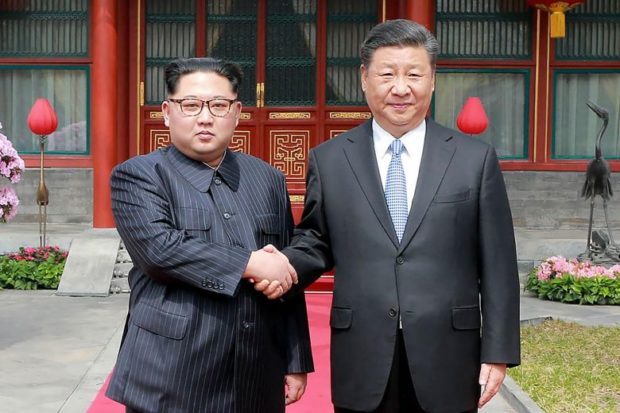Pledges of better ties, denuclearization at Kim-Xi meeting

At his meeting with Chinese President Xi Jinping, North Korean leader Kim Jong Un pledged commitment to the denuclearisation of the Korean peninsula. PHOTO: AFP PHOTO/KCNA VIA KNS
BEIJING — China and North Korea reaffirmed their ties after drifting apart over the past months, in a surprise visit to Beijing this week by North Korean leader Kim Jong Un that was confirmed by the two sides yesterday.
At his meeting with Chinese President Xi Jinping, Mr Kim pledged commitment to the denuclearisation of the Korean peninsula, something the Chinese had pushed for and which Mr Xi had highlighted as his country’s goal.
Mr Kim also vowed to maintain strategic communication with Chinese leaders regarding his engagement with South Korea and the United States over the nuclear issue, effectively bringing China into the picture on this.
Article continues after this advertisementArticle continues after this advertisement
China appeared to have been sidelined as Mr Kim prepared to meet South Korean President Moon Jae In next month and possibly US President Donald Trump in May.
The ties between China and North Korea – which had slipped after the first nuclear test by the North in 2006 – became particularly bad in the past several months after Beijing imposed severe economic sanctions on Pyongyang to rein in its nuclear and missile programmes.
But Mr Kim’s visit appeared to turn things around.
The Chinese capital had been abuzz with speculation about his visit since Monday, when a green train resembling that used by his late father Kim Jong Il to travel to China was seen trundling across the border at the north-eastern Chinese city of Dandong, and later pulling into Beijing station. Security was also tight around various venues in the city where Chinese leaders meet foreign dignitaries.
However, confirmation of the visit came only yesterday, though Mr Kim’s train had been seen leaving Beijing on Tuesday. Reports of the unofficial visit came from Chinese state news agency Xinhua and North Korea’s KCNA.
Both leaders were reported to have pledged to continue with the “traditional friendship” of their two countries, and to develop it further.
“This is a strategic choice and the only right choice both sides have made based on history and reality,” Mr Xi was quoted as saying.
Mr Kim, for his part, said the friendship between the two sides was “unshakable”, and echoed that it was a “strategic choice” for his country to deepen this “traditional friendship”.
He added that in the process towards resolving the issue of denuclearisation of the Korean peninsula, he would enhance strategic communications with China.
Chinese media yesterday applauded the visit, with the People’s Daily saying in an editorial that “the meeting between Xi and Kim will surely promote the bilateral traditional friendship to a new level, inject fresh impetus in the turnaround of the peninsula situation, and play a fundamental role in peace, stability and development regionally and globally”.
Reaction elsewhere was more cautious, with some US experts saying closer ties between China and North Korea would help the North undermine sanctions and raise the cost of any US military action.
“If you are the Trump White House right now, you have got to be very concerned,” said Dr John Park of the Harvard Kennedy School, according to Bloomberg.
Japan expressed worries that it would be left behind in the rapid progress over North Korea and it would have no place at the table to shape developments.
Seoul, however, welcomed the thaw in China-North Korea ties, saying this could work in South Korea’s favour while it pushes for engagement with the North to improve ties after a decade of tension.
A spokesman for South Korea’s Foreign Ministry voiced the hope that the Kim-Xi summit will “contribute to denuclearisation and peace-building on the Korean peninsula”.